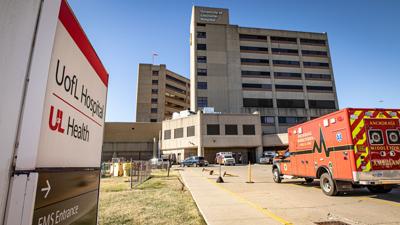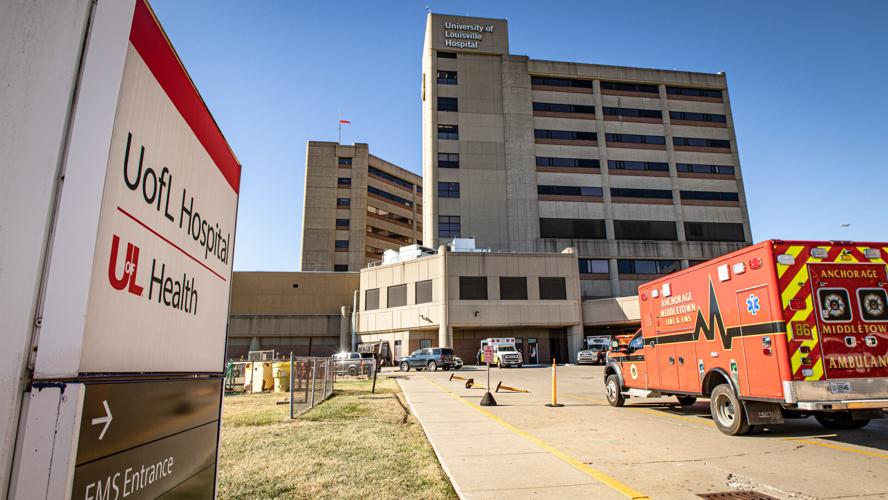LOUISVILLE, Ky. (WDRB) -- Thousands of Medicare Advantage members in the Louisville area have been unable to access in-network care at Baptist Health for nearly four months.
Now, a second major healthcare provider — University of Louisville Health — is also at odds with insurance companies that run Medicare Advantage plans.
"We’re in a little bit of a dispute right now with Medicare Advantage companies," UofL Health CEO Tom Miller said during the organization's board meeting on Wednesday. "… Medicare Advantage today means: deny the care, postpone the care, or don’t pay."
UofL Health does not appear to be on the verge of a contract dispute — like Baptist Health’s ongoing standoff with United Health and WellCare — with Medicare Advantage insurers. The organization has no "upcoming pending renewal dates" for Medicare Advantage contracts, UofL Health spokesman David McArthur said in an email.
But UofL Health will be "working pretty hard with these companies" as well as the Kentucky and national hospital associations to address the health system’s complaints, Miller said during Wednesday’s meeting.
Miller didn’t name individual insurers, and McArthur would not provide a list of UofL Health’s contracted companies.
The 130,000 people who have Medicare Advantage plans in the Louisville-Southern Indiana primarily get the coverage through Humana Inc., Anthem-Blue Cross Blue Shield and United Health, according to WDRB’s analysis of federal data.
None of the insurers responded to WDRB News’ requests for comment.
Medicare Advantage is an alternative way for senior citizens to receive their federal Medicare benefits through private insurers. More than half of the Medicare population — about 33 million people — are enrolled in the program.
Louisville-based Humana, the largest corporation based in Kentucky, garners about 80% of its more-than $100 billion in annual revenue from Medicare Advantage.
Seniors who chose the private plans receive benefits not provided by traditional Medicare, such as dental, vision and hearing coverage — even money for groceries or rides to doctors’ appointments.
The tradeoff is that, unlike regular Medicare, Medicare Advantage members accept insurance networks that restrict which doctors and hospital systems they can see at "in network" rates and navigate insurance controls on spending, such as prior authorizations.
UofL Health — which boasts nine hospitals, four outpatient centers and more than 1,000 doctors — ends up receiving 16% less from Medicare Advantage plans than from regular Medicare because of the insurers’ maneuvers to delay or skirt paying, Miller said during the board meeting.
"They’re not following the rules that are out there," Miller said. "… And they always deny care after the fact, not beforehand, but … after we’ve already provided the services."
McArthur added that UofL Health’s issues with Medicare Advantage plans "are not unique. They are part of a statewide and national discussion."
He pointed to a recent survey of health systems indicating 45% are considering dropping Medicare Advantage plans.
At Baptist — a health system of similar scale to UofL Health — disputes with Medicare Advantage insurers boiled over last September, when Baptist and Humana did not renew their contract and thousands of patients had to change doctors or delay care to avoid paying exorbitant rates.
Baptist and Humana settled in March after about six months. In the meantime, Baptist broke ranks with United Health and WellCare plans on Jan. 1, and it remains out of network with those Medicare Advantage insurers, spokeswoman Kit Fullenlove confirmed this week.
Like UofL Health, Baptist’s primary issues with Medicare Advantage companies involve procedural barriers to care.
"It is our experience – and the experience of other healthcare providers across the country – that many Medicare Advantage plans routinely deny or delay approval or payment for medical care recommended by a patient’s physician," the health system said in a statement last year.
Besides Baptist and UofL Health, the other major health system in Louisville is Norton Healthcare.
"Medicare Advantage plans denying coverage of a procedure or visit after the fact is not sustainable," Norton spokeswoman Renee Murphy said in an emailed statement. "Unfortunately, this is what we are experiencing and what other health systems are seeing around the country. Patients on Medicare Advantage deserve better, and we’re going to do everything we can to advocate for them."
Medicare Advantage faces ‘squeeze’
The health systems’ frustrations come as insurers like United Health and Humana are finding it harder to wring profits from Medicare Advantage thanks to flat federal payments and regulatory changes.
"The economies of Medicare Advantage are being squeezed," David Windley, an analyst at investment bank Jefferies, told WDRB News in January.
Humana executives told analysts this week that the company will have to offer less generous benefits and even shrink its national footprint in Medicare Advantage in 2025 to make ends meet.
The company also predicted a years-long slog to achieve a narrow, 3% profit margin on the business.
Despite those challenges, Humana executives said Medicare Advantage will continue to grow in the long term because it’s a good deal for seniors.
Humana CEO Bruce Broussard pointed to an often-cited, industry-sponsored study that says seniors save about $2,400 a year through the program when spending on needs like dental and vision are included.
"You see that (average savings) stepping back a little bit for 2025 as a result of the benefit changes, but not material to make it something that we feel like shopping for the Medicare fee-for-service side will increase," he said on the company’s April 24 earnings call. "…What we see is that the value proposition will still be greater than it was three or four years ago."
Related Content:














